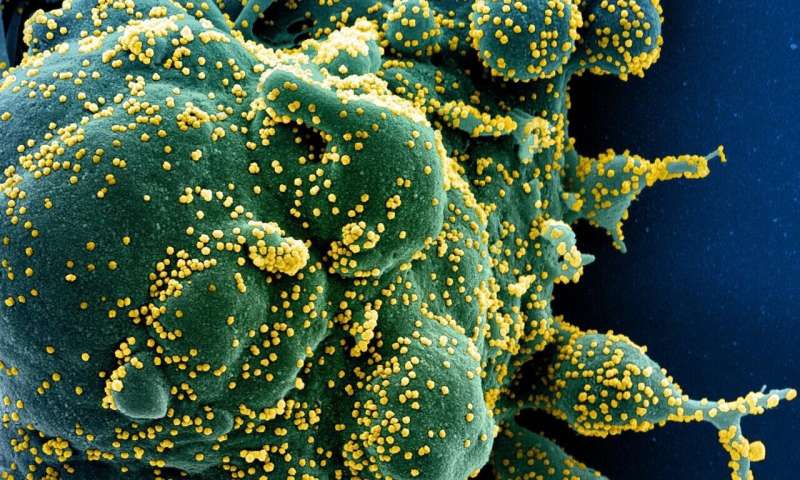Colorized scanning electron micrograph of an apoptotic cell (green) heavily infected with SARS-COV-2 virus particles (yellow), isolated from a patient sample. Image captured at the NIAID Integrated Research Facility (IRF) in Fort Detrick, Maryland. Credit: NIH/NIAID
A team of investigators from the Republic of China has discovered that 6 drugs previously approved by the US Food and Drug Administration (FDA) for other indications could be repurposed to treat or prevent COVID-19. The research is published in Antimicrobial Agents and Chemotherapy, a journal of the American Society for Microbiology.
Using FDA-approved drugs saves time—the drugs don't need to go through the FDA approval process again—making them available quickly to treat patients who need them.
The research shows that the investigators screened 2 large drug libraries cumulatively containing 3,769 FDA-approved drugs and found drugs that can inhibit 2 protein-cutting enzymes, called proteases, that are essential to the replication of SARS-CoV-2.
The assays for testing the drugs involved growing the virus in petri dishes, applying each drug to different petri dishes containing the virus, and then conducting plaque reduction assays to determine each drug's effectiveness. The original outbreak strain, clade S, was used in the assays. ('Clade' is a technical term for a familial group.)
The researchers, led by corresponding author Po-Huang Liang, Ph.D., also plan to test the drugs against the dominant GR strain, which was the first variant to emerge, in late January or February, 2020, and the recent, highly contagious United Kingdom strain. Dr. Liang is research fellow and professor at the Institute of Biological Chemistry, Academia Sinica, Taiwan, Republic of China.
Their research also enables the investigators to better understand how coronavirus proteases recognize their substrates during replication. That will help them tweak the drugs they identified to be more effective inhibitors against the protease.
"Despite the variations of the virus strains emerging over the years, considering the significance of the 3CL protease in the viral replication, and the relatively low likelihood for this protein target to mutate, we aim to develop a broad spectrum of antiviral drugs using our platform, helping to prevent the emergence of future pathogenic SARS-CoV strains," said Dr. Liang.
Dr. Liang's group began working on one of the proteases, known as 3CLpro, 18 years ago, during the outbreak of the original SARS virus. At that time, Coauthor Chih-Jung Kuo was Dr. Liang's Ph.D. student, and the research was the subject of his Ph.D. dissertation. Dr. Kuo is now Associate Professor at the Department of Veterinary Medicine, National Chung Hsing University, Taiwan, Republic of China.
More information: Chih-Jung Kuo et al. Kinetic characterization and inhibitor screening for the proteases leading to identification of drugs against SARS-CoV-2, Antimicrobial Agents and Chemotherapy (2021). DOI: 10.1128/AAC.02577-20
Journal information: Antimicrobial Agents and Chemotherapy
Provided by American Society for Microbiology
























